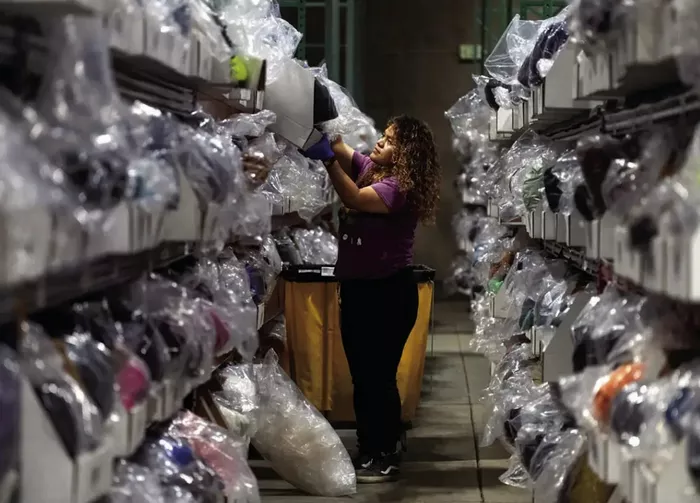As trade tensions continue to generate uncertainty and threaten to raise prices for foreign-made outdoor products, a potential opportunity is emerging for the outdoor retail industry. The secondhand gear market, long touted as a sustainable and affordable alternative to new equipment, may gain momentum as consumers begin to feel the financial pressure of tariff-induced price hikes.
For years, both manufacturers and secondhand retailers have promoted re-commerce—also referred to as the circular economy—as a means of reducing waste, protecting the environment, and providing more budget-friendly options for those new to outdoor recreation. With the possibility of escalating costs for new products, the appeal of refurbished and gently used gear is becoming more pronounced. The outdoor industry, which reached $28 billion in retail sales in 2024, could see secondhand gear become a more integral part of its business model.
Kelly Davis, research director for the Outdoor Industry Association, believes the shift is already in motion. She notes that if economic pressures cause consumers to cut back on spending, the circular economy is likely to expand. Selling affordable, pre-owned gear offers a dual benefit: it supports consumers facing financial constraints while simultaneously helping the environment. Davis views this shift as an opportunity for the industry to reassess its contribution to waste and rethink long-term sustainability goals.
As the global supply chain is strained by tariffs and delays, the uncertainty makes it difficult to predict the full impact on the outdoor retail sector. Nonetheless, retailers are closely monitoring consumer behavior, aware that a decline in spending could signal deeper economic troubles. Aaron Provine, president of Geartrade.com, an online secondhand gear marketplace, anticipates more shoppers turning to used equipment if tariffs remain in place. Although the market is still in flux, he expects resales to grow if new gear prices continue to climb.
The outdoor retail sector has experienced fluctuations since 2020, including a pandemic-driven sales boom, a subsequent slump, and now a modest recovery. In 2024, total sales grew slightly by 1% compared to the previous year. However, this growth was concentrated in casual apparel and footwear rather than core technical gear, reflecting changing consumer habits. According to Kent Ebersole, president of the Outdoor Industry Association, the industry’s growth is now driven by more casual participants—those who use outdoor gear not just for adventure but also as lifestyle apparel.
Retailers reported steady sales in early 2025, but April brought signs of slowing activity, likely due to economic uncertainty and tariff-related price increases. Some brands, especially those with resale or circularity programs, seem to be more resilient in this environment. Charlie Lozner, head of digital media at the marketing agency Backbone, mentioned that one client saw a 70% increase in resale revenue in April compared to the same time in 2024.
Despite the benefits of re-commerce, industry professionals are not celebrating the arrival of more tariffs. Jimmy Funkhouser, owner of Feral Mountain Co., a Denver-based outdoor shop known for its secondhand gear model, acknowledges the serious economic risks. While he believes the secondhand market will continue to expand in the coming years, he also warns that a broader economic downturn would negatively affect everyone, including businesses built on resale.
In Colorado, Tersus Solutions is at the forefront of re-commerce innovation. Its facilities in Denver and Englewood use liquid CO2 rather than water to clean and refurbish textiles for resale. CEO Peter Whitcomb noted a significant uptick in brands approaching Tersus for help with cleaning and repairing gear, many of whom had previously shown little interest. The current tariff situation, he says, is accelerating conversations about sustainable and circular business models.
Whitcomb and environmentally focused brands like Patagonia and The North Face have long advocated for manufacturing durable products that can be repaired and resold multiple times. This approach not only supports environmental goals but also presents a compelling financial case in a tariff-heavy landscape. Whitcomb believes that consumers themselves can become part of a decentralized supply chain, with their garages acting as hubs for high-quality, usable gear awaiting a second life. In his view, this is the future of consumption, especially for younger shoppers who are more inclined toward sustainability and affordability.
At the same time, the industry is making concerted efforts to attract and retain new outdoor enthusiasts. During the pandemic, record numbers of Americans embraced outdoor activities, and the sector is striving to maintain that engagement. According to Davis, outdoor participation reached an all-time high in 2024, with 181.1 million Americans venturing outside for recreation. This growth, which spans all demographics, represents a continuation of the trend that began in 2020 after years of stagnant participation.
Historically, the industry has struggled to engage more than half the U.S. population in outdoor activities. Davis’s data suggests that progress is finally being made, with more people from diverse backgrounds participating in hiking, camping, and other forms of recreation. While the road ahead remains difficult due to economic headwinds and unpredictable trade policies, Davis remains cautiously optimistic. She believes that if the industry can weather the current storm, it will emerge with a larger market and a stronger focus on sustainable practices.
For outdoor retailers and manufacturers, the challenge now is to stay afloat during a period of significant disruption. Re-commerce could serve as a lifeline, helping the industry transition through the turbulence. As Davis puts it, the sector is on the brink of something transformative. If businesses can maintain consumer interest and community engagement, the future may hold not only more participants but also a reimagined approach to production, consumption, and environmental responsibility.
Related Topics
- Coletta & Tyson Offers the Ultimate Outdoor Living Experience This Summer
- Somerley House to Host Outdoor Cinema Experience This Summer
- Swansea Council Unveils £10 Million Investment in Changing Rooms and Outdoor Facilities

